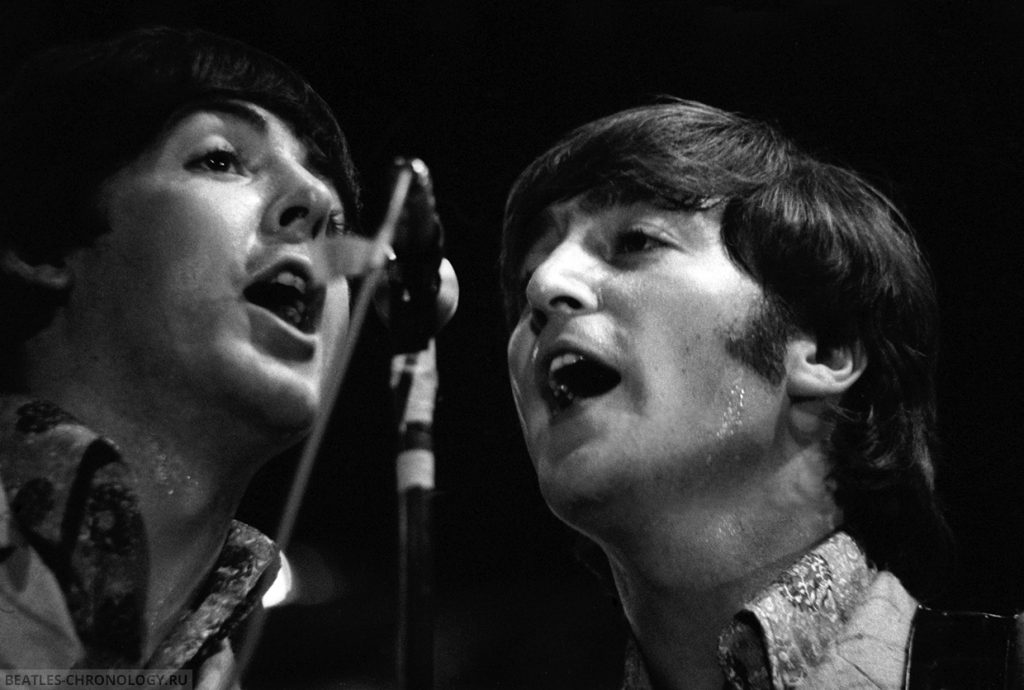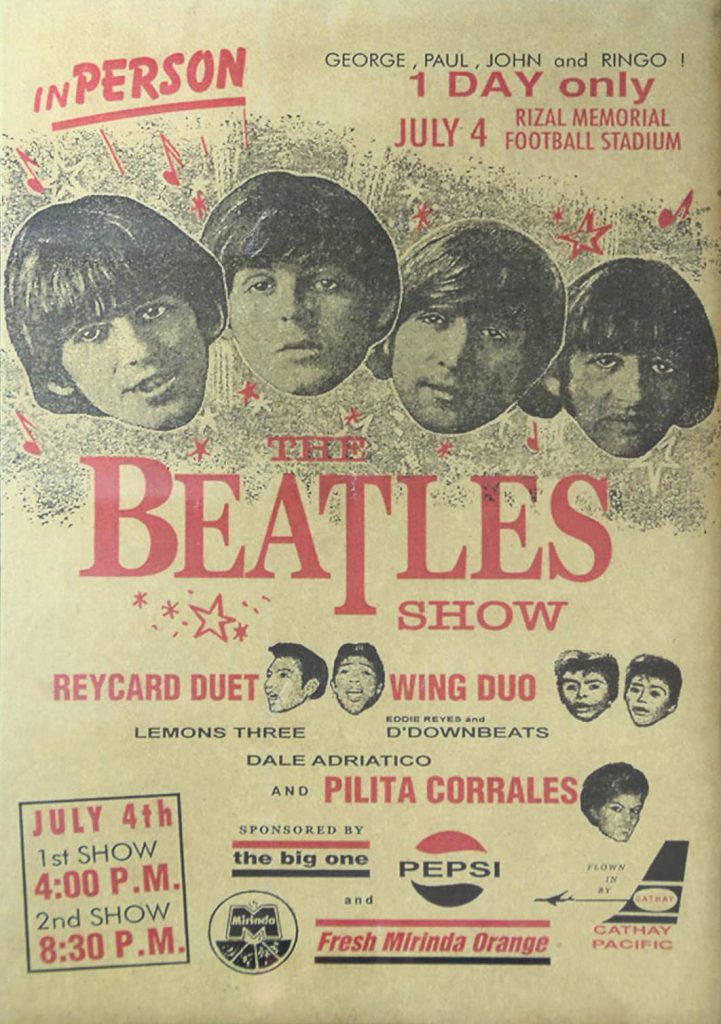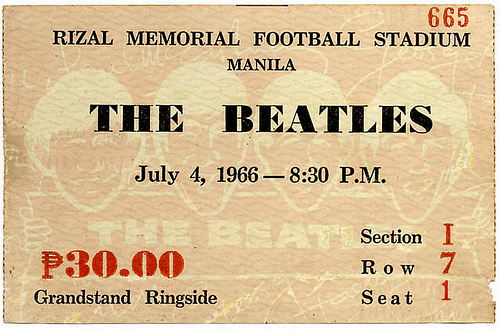Monday, July 4, 1966
Manila • 8:30pm show
Concert • By The Beatles • Part of the 1966 Japan and Philippines Tour
Last updated on October 23, 2023
Monday, July 4, 1966
Concert • By The Beatles • Part of the 1966 Japan and Philippines Tour
Last updated on October 23, 2023
Location: Rizal Memorial Football Stadium
Interview Jul 03, 1966 • Press conference in Manilla
Concert Jul 04, 1966 • Philippines • Manila • 4pm show
Concert Jul 04, 1966 • Philippines • Manila • 8:30pm show
Article Jul 05, 1966 • The Beatles travel from the Philippines to India
Interview Jul 05, 1966 • Paul McCartney interview for The Manila Times
Next concert Aug 12, 1966 • USA • Chicago • 3pm show
Jul 08, 1966 • From ITN
Jul 08, 1966 • From Reuters
Press conference at London airport
Jul 08, 1966
Interview for the Manila Times
Jul 05, 1966 • From The Manila Times
Jul 03, 1966
The Beatles travel from Japan to the Philippines
Jul 03, 1966
We don’t want to offend anyone, especially since we’re visiting in this country. We just want to sing.
Paul McCartney – Interview for the Manila Times, July 5, 1966
The Beatles landed at Manila Airport the previous day, at 4:30 pm and were driven to the Philippine Navy Headquarters where a press conference was held. Afterwards, they were taken to a private yacht owned by a wealthy Filipino named Don Manolo Elizalde, a friend of local concert promoter Ramon Ramos Jr. Late in the evening, they left the boat and went to the Manila Hilton. They finally made it to the hotel at 4 am.
Also on the day of their arrival, The Manila Sunday Times ran a story explaining The Beatles had been invited as guests by the Philippines’ First Lady, Imelda Marcos, on August 4, at 11 am.
On the morning of August 4, The Beatles were woken up by security guards to go and join the invitation but declined to join anyway. At 4 pm, they played their first concert in Manila, in front of 30,000.
The second concert took place at 8:30 pm and was attended by 50,000 fans.
When they left the stadium, they realized that there were no more police escorts. They made it back to the hotel but clearly, something strange was going on. Late-afternoon TV news then announced that the Beatles had snubbed the Philippines’ First Lady, prompting Brian Epstein to give his explanations on TV.
From Wikipedia:
[…] The combined total of 80,000 was the largest audience to see the Beatles in concert on a single day. The band were well received by their fans, although the poor sound and the distance from the stage was a problem for many. In his review of the concerts, Filipino writer Nick Joaquin detected a halfheartedness in the Beatles’ performance and said that even the fans’ screams “seemed mechanical, not rapture but exhibitionism”. Another reviewer concluded: “The sound was terrible, The Beatles were terrific.”
After watching the continual news broadcasts at the hotel, between the two shows, Epstein resolved to record a message to explain the Beatles’ nonappearance at Malacañang Palace. The message was filmed by the government-owned Channel 5, at the Manila Hotel. When the segment was broadcast later that evening, however, the sound was distorted – a seemingly deliberate act – and Epstein’s explanation was rendered inaudible. Barrow recalls that a backlash against the Beatles was evident straight after the evening show at Rizal, when their convoy of cars was briefly trapped behind a closed gate and surrounded by a large crowd of “organised troublemakers”. As the NEMS representative who had dealt directly with the Filipino promoter, Lewis was taken away by police officers during the night and subjected to a three-hour interrogation for his role in “snubbing” the Philippines. Lewis contacted the British Embassy, where Minford, in a telegram to the Foreign Office, reported that “a technical hitch over payment of Philippine income tax” was likely to delay the Beatles’ departure. Death threats against the Beatles were reported at the embassy and at their hotel.
Back at the Manila Hotel between shows I watched the early evening television news with Brian Epstein. As part of an extended report on the visit of The Beatles, which I taped in sound only and kept on my cassette recorder, there were scenes from the Malacanang Palace showing intimate friends of the First Family and their children lining up with a crowd of Manila’s upper crust in a sumptuous reception room. “The children began to arrive at ten,” the newsreader began. “They waited until after two. At first, we were told that a mob at the yacht basin was delaying the scheduled arrival of The Beatles. Then we learned that the group was not even aboard. At noon the First Lady decided properly and wisely not to wait any longer. ‘The children have all the time in the world, but we are busy people,’ she said. The place cards for The Beatles at the lunch table were removed. This was the most noteworthy East-West mix-up in Manila for many years.”
Public hostility towards The Beatles escalated with alarming speed after the television broadcast. Staff at the British Embassy warned me that they were receiving death threats directed at The Beatles. In an urgent damage-limitation exercise I wrote a statement for Epstein to read to the media and I persuaded Channel 5 television to send a news crew to film an interview with him in his hotel suite for their later bulletin. Epstein diligently explained to the camera that neither he nor the group had been handed any invitation: “The first we knew of the hundreds of children waiting to meet The Beatles at the palace was when we watched television earlier this evening.” When his statement was transmitted a few hours later by Channel 5, almost everything Epstein said was blotted out by unexplained interference so that nobody heard his explanation. The sound quality was fine for the rest of the programme.
At the end of the second concert, our police escort back to the hotel was withdrawn and gates were locked against our convoy. This left our stationary limousines at the mercy of organised troublemakers, scores I would say rather than dozens, pressing menacingly against our windows, rocking the vehicles to and fro and yelling insults at The Beatles which none of us could understand. George said later: “It was a very negative vibe. We were being bullied.” Eventually, the gates were opened and we sped away. Back at the hotel, we warned the boys to lock their doors and we did the same. An hour later a police deputation took Vic Lewis away for questioning. He told us that at police HQ he had heard the same question repeated over and over again: “You represent The Beatles. Why did you not bring them to the palace?” It was almost dawn when Lewis was driven back to the hotel.
Tony Barrow – From “John, Paul, George, Ringo & Me: The Real Beatles Story” by Tony Barrow, 2006
Brian and I were watching television when the late-afternoon news came on. There on the screen was Imelda Marcos wandering forlornly around her palace, having been snubbed by the Beatles. The commentary explained that they had never turned up at a party held in their honor and, to add insult to injury, the 300 children who were also disappointed by the Beatles were war orphans and cripples. A palace spokesman said the Beatles had “spit in the national eye,” or something to that effect. The moment the broadcast was finished, Brian was on the phone with the manager of the government-run TV station, determined to make an explanation to the people of the Philippines. He and I rushed right over to the TV station, where, much to our surprise, he was brought into the studios and put in front of a camera. Regular programming was then interrupted, and Brian went out live all over the country. He had only started his apology when word was received from the Malachang fortress to disrupt the sound portion of the broadcast. Brian’s explanation and eloquent apology were never heard.
The Beatles were totally ignorant of any of this. After their concerts they were brought back to the hotel in their limousines. The evening proceeded normally with a card game, a few scotch and Cokes, and a shared joint. The boys decided to turn in early, as we were due at the airport first thing the next morning to make an early flight to New Delhi, India, where we intended to vacation for a few days.
In the middle of the night, Vic Lewis was dragged from his hotel room by three army policemen and brought to a police station. He was interrogated for most of the night by two Gestapo-like officers who kept demanding, “Why did you not go to the party?”
Peter Brown – From “The Love You Make: An Insider’s Story of the Beatles“, 2002
At the end of the second concert, our police escort back to the hotel was withdrawn and gates were locked against our convoy. This left our stationary limousines at the mercy of organised troublemakers, scores I would say rather than dozens, pressing menacingly against our windows, rocking the vehicles to and fro and yelling insults at The Beatles which none of us could understand. George said later: “It was a very negative vibe. We were being bullied.” Eventually, the gates were opened and we sped away. Back at the hotel, we warned the boys to lock their doors and we did the same. An hour later a police deputation took Vic Lewis away for questioning. He told us that at police HQ he had heard the same question repeated over and over again: “You represent The Beatles. Why did you not bring them to the palace?” It was almost dawn when Lewis was driven back to the hotel.
Tony Barrow – From “John, Paul, George, Ringo & Me: The Real Beatles Story” by Tony Barrow, 2006



On the following day, The Beatles awoke to chaotic scenes and were threatened when leaving the country to fly to India.
This was the 2nd concert played at Rizal Memorial Football Stadium.
A total of 2 concerts have been played there • 1966 • Jul 4th (4pm show) • Jul 4th (8:30pm show)
Written by Chuck Berry
Written by George Harrison

Notice any inaccuracies on this page? Have additional insights or ideas for new content? Or just want to share your thoughts? We value your feedback! Please use the form below to get in touch with us.